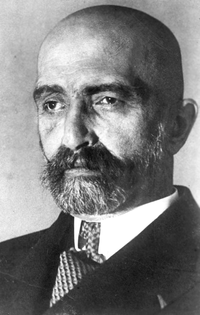Walery Sławek
| Walery Sławek | |
|---|---|
 | |
| Walery Sławek | |
| Prime Minister of Poland | |
| In office 29 March 1930 – 23 August 1930 | |
| Preceded by | Kazimierz Bartel |
| Succeeded by | Józef Piłsudski |
| Prime Minister of Poland | |
| In office 5 December 1930 – 26 May 1931 | |
| Preceded by | Józef Piłsudski |
| Succeeded by | Aleksander Prystor |
| Prime Minister of Poland | |
| In office 28 March 1935 – 12 October 1935 | |
| Preceded by | Leon Kozłowski |
| Succeeded by | Marian Zyndram-Kościałkowski |
| Sejm Marshal | |
| In office 22 June 1938 – 27 November 1938 | |
| Preceded by | Stanisław Car |
| Succeeded by | Wacław Makowski |
| Personal details | |
| Born | Walery Jan Sławek 2 November 1879 Strutynka, Russian Empire |
| Died | 3 April 1939 (aged 59) Warsaw, Poland |
| Resting place | Powązki Military Cemetery |
| Nationality | Polish |
| Political party | Polish Socialist Party |
| Occupation | Politician, soldier |
| Religion | Roman Catholicism |
Walery Jan Sławek (Polish pronunciation: [vaˈlɛrɨ ˈjan ˈswavɛk] (![]() ); 2 November 1879 Strutynka, Russian Empire, today Ukraine – 3 April 1939 Warsaw) was a Polish politician, military officer and activist, who in the early 1930s served three times as Prime Minister of Poland. He was one of the closest aides of Polish leader, Józef Piłsudski.
); 2 November 1879 Strutynka, Russian Empire, today Ukraine – 3 April 1939 Warsaw) was a Polish politician, military officer and activist, who in the early 1930s served three times as Prime Minister of Poland. He was one of the closest aides of Polish leader, Józef Piłsudski.
Life
He was a member of the Combat Organization of the Polish Socialist Party and in 1908 Sławek had taken part in the Bezdany raid organized and led by Józef Piłsudski — a train robbery that had financed Piłsudski's organization.
He was active in the Komisja Tymczasowa Skonfederowanych Stronnictw Niepodległościowych from 1912-1914. After the oath crisis in 1917 he was detained by the Germans. He was released on 12 November 1918.
During the Polish-Soviet War he was the chief of military intelligence. In 1928 he created the Non-partisan Bloc for Cooperation with the Government. On 30 March 1930 he became the Prime Minister of Poland. He resigned on 23 August the same year, but he returned to office on 4 December. He resigned once again on 26 May 1931. He commenced his third term as prime minister on the 28 March 1935 and served until 12 October of that year.
Józef Piłsudski, selected Sławek as his choice for President of Poland in early 1935, but soon after Piłsudski's death (May 1935), Sławek was outmanoeuvred by his political rivals and lost most of his political influence. He was briefly Marshal of the Sejm (parliamentary Speaker) from 22 June to 27 November 1938. However, he failed to retain his parliamentary seat at the general elections of 1938.
On 2 April 1939 at 8:45 pm (the exact hour of Piłsudski's death), Sławek shot himself in his apartment. He died the next day in hospital.[1]
Honours and awards
- This article incorporates information from the Polish Wikipedia.
- Order of the White Eagle
- Silver Cross of the Virtuti Militari
- Independence Cross with Swords
- Cross of Valour - four times
- Order of the Cross of the Eagle, 1st Class (Estonia, 1934)
See also
- Prometheism
References
- ↑ Włodzimierz Kalicki: 2 kwietnia 1939. Stary browning at Gazeta Wyborcza, 2 April 2006.
| Wikimedia Commons has media related to Walery Sławek. |
| Political offices | ||
|---|---|---|
| Preceded by Kazimierz Bartel |
Prime Minister of Poland 1930 |
Succeeded by Józef Piłsudski |
| Preceded by Józef Piłsudski |
Prime Minister of Poland 1930–1931 |
Succeeded by Aleksander Prystor |
| Preceded by Leon Kozlowski |
Prime Minister of Poland 1935 |
Succeeded by Marian Koscialkowski-Zyndram |
| |||||
| |||||||||||||||||
|